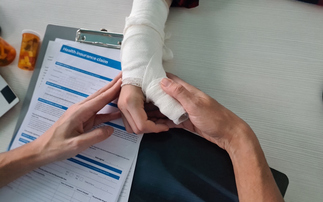Rehabilitation expert Monica Garcia predicts the future impact of the pandemic on income protection claims experience
Working patterns and lifestyles have transformed literally overnight for millions of UK workers. There is emerging evidence on the impact lockdown and such changes are having on the health and wellbeing of employees from a psychological, physical, and socio-economic perspective.
Furthermore, many of the changes that were meant to be temporary, are now becoming the new normal, with many workers experiencing ongoing uncertainty regarding future work arrangements. But what does this mean to the income protection industry in terms of claims experience? Inevitably we can predict that all the strain being felt on many working adults it's likely to reach a tipping point in the future, if not already.
The following is a reflection of some of the key Covid-19 issues that are being explored at present and its relevance to the IP claims market.
The furlough scheme
This is effectively a form of income replacement for individuals who are not working. The unintended consequences however, relate to the impact that a prolonged period of work absence has on workers' general health (psychological/physical), and readiness to work.
There is evidence that an overall deconditioning occurs when someone is absent from work (1). Recently, Dame Carol Black (2), spoke of the similarities and risks of the current furloughed scheme in relation to the benefits system in the UK. She pointed out that anxiety and fear of returning to work were real barriers, and that after a period of time (six weeks), it was hard to help people get back into work. In addition to this, many furloughed workers are at risk of losing their jobs, adding a further layer of complexity into the return to work process.
As the furloughed scheme comes to an end by October 2020, it is likely that many workers' functional capacity for work will be affected, not just by an overall deconditioning, but probably by the accumulation of stressors that employees may have faced throughout 2020, with some feeling vulnerable and concerned regarding health and safety measures in their workplace, if unable to work from home.
IP providers are likely to see an increase in claims queries from furloughed workers. It will be challenging to assess these claims against the policy definition, with the added deconditioning effect, and a wide range of personal stressors and health conditions, including recovery from Covid-19.
Delayed treatment access
There have been reports that during lockdown, the general population was reluctant to access routine healthcare appointments, and in some instances, NHS routine care has been postponed for many patients.
There is a risk of missed opportunities to access medical support early, which could result in the worsening of symptoms without appropriate management. This can range from common musculoskeletal and mental health conditions, to more severe scenarios such as cancer.
I remember a recent article pointing to a decrease in the number of critical illness (CI) claims for the month of April 2020 (3) that could be related to the delays in obtaining a definite diagnosis. In terms of IP claims experience, there could be an increase in new cases due to the functional impact suboptimal management of existing health conditions can have on the ability to work.
But also, there could be an increase related to common musculoskeletal scenarios due to prolonged home working arrangements that do not adhere to ergonomic guidelines. Interestingly, a recent survey of UK home workers, identified an increase in musculoskeletal pain complaints, with the most common being: neck, shoulder, and back pain (4).
On a more positive note, I expect that the added value benefits of many IP products, regarding remote access to GP consultations, counselling, physiotherapy and early intervention (EI) to name a few, will help address some of the concerns in relation to access to timely medical care. Such services can have a real impact in supporting the claimant and preventing any deterioration of symptoms in the long term.
Mental health claims
Prior to lockdown, stress, depression or anxiety accounted for 44% of all work-related ill health cases and 54% of all working days lost due to ill health in the UK (5). These figures were already significant, but unfortunately, it is likely that the direct and indirect impact of Covid-19 has exacerbated existing stressors and added new ones.
Many employees who have remained at work, have been affected by bereavement, and/or are having extra caring responsibilities in addition to work. Sleep problems and ongoing worries are the most common symptoms reported, with a risk of exhaustion that could lead to presentism and work absence in the future (6).
Workers in manual occupations generally do not have the option of flexible home working. This occupational group might be at risk of sickness absence related to anxiety and fear of returning to the workplace (similar to furloughed workers). In addition, the nature of manual occupations may pose a higher risk of exposure to contracting Covid-19, which in turn will further feed workers' fears of returning to work (7).
In the short term there might be an increase in mental health IP claims above the usual average, with a wide range of mental health complaints, depending on the nature of individual circumstances and occupation - e.g white collar workers versus manual occupations.
Traditional IP products with long deferred periods of 26 and 52 weeks might not see new claims coming until later on, but the claims presentation is likely to be complex after the time elapsed since the date of first sickness absence.
The role of employers
Health and Safety and Occupational Health material is being made available almost on a daily basis, with helpful practical advice (8,9,10,11).
Employers have the duty to make the workplace safe for their employees, however, supporting people to return to work and remain at work will require a tailored individual approach that genuinely addresses the unique circumstances of each employee.
Common individual return to work factors include: coping strategies, beliefs, perceived level of control, empowerment, worries and fears of acquiring or worsening health conditions. Together with workplace factors regarding job design and the ability to accommodate reasonable adjustments (12), the impact on sickness absence, could be mitigated.
Closing thoughts
With IP sales increasing in the market, we need to be prepared to support our customers during this incredibly difficult and confusing time. Clear, jargon free, but tactful communication, will be essential to manage new IP claim queries coming in.
We will not fully learn the long term impact of the new enforced ways of working for a while, but there is an opportunity to live more balanced lives, where employers do genuinely put the health and wellbeing of the workforce at the front, not just during Covid-19, but for the long term.
Monica Garcia is a health and wellbeing insurance consultant
References
1 Black, C and Frost D (2011) Health and work and Independent Review of sickness absence: Health at work - an independent review of sickness absence
2 Furloughed scheme's effect on health and work Times letters: Furlough scheme's effect on health and work
3 L&G: Significant drop in CI claims during April L&G: Significant drop in CI claims during April
4 Bevan S, Mason B, Bajorek Z (2020) IES Working at Home Wellbeing Survey. Institute for Employment Studies.UK IES Working at Home Wellbeing Survey
5 https://www.hse.gov.uk/statistics/causdis/stress.pdf
6 Bevan S, Mason B, Bajorek Z (2020) IES Working at Home Wellbeing Survey. Institute for Employment Studies.UK IES Working at Home Wellbeing Survey
7 Shaw WS, Main CJ, Findley PA, Collie A, Kristman VL, Gross DP. Opening the Workplace After COVID-19: What Lessons Can be Learned from Return-to-Work Research? [published online ahead of print, 2020 Jun 19]. J Occup Rehabil. 2020;1-4. https://rdcu.be/b5kvz
8 Helping keep the high street safe in the pandemic Helping keep the high street safe in the pandemic
9 Sustaining work relevant mental health post COVID-19 Tookit. Sustaining Work-Relevant Mental Health Post COVID-19 Toolkit
10 Supporting mental health of employees during and beyond COVID-19: A toolkit for business leaders and managers AXA Asia
11 Employers should cut hours not people. Opinion: Employers should cut hours not people during the pandemic
12 Shaw WS, Main CJ, Findley PA, Collie A, Kristman VL, Gross DP. Opening the Workplace After COVID-19: What Lessons Can be Learned from Return-to-Work Research? [published online ahead of print, 2020 Jun 19]. J Occup Rehabil. 2020;1-4. https://rdcu.be/b5kvz











